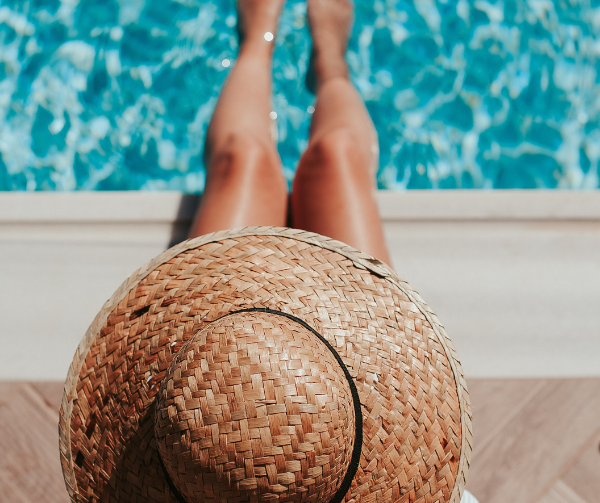
Before you slather yourself and your kids with sunscreen this summer, let’s talk about sunscreen.
Sunscreen is a multi-billion-dollar industry, yet there are no studies that prove that the use of sunscreen protects us from melanoma and basal carcinoma. In fact, the fatal types of melanoma never see the sun (the bottom of your foot and the anus).
However, ever since 1978, when the first UVA sunblock was marketed, sunscreen sales have soared, but so too has melanoma.
Sunscreen has also been found in studies to cause leaky gut, hormonal dysfunction and neurological dysfunction.
Research by the Environmental Working Group has found that chemicals in sunscreen are very big endocrine disruptors. Sunscreen is estrogenic, a potent anti-testosterone, and causes other adverse hormonal effects by possibly interfering with the thyroid. Of the 1400+ sunscreens tested, only 5% met their safety standards and over 40% considered skin cancer contributors. You can read more here and here.
When you first get in the sun, antioxidants are protecting you. When these antioxidants can no longer protect you, that is when your skin starts to burn. When you use sunscreen, you are only blocking the 4% that is UV but the 47% that is infrared goes much deeper into the skin and into the mitochondria (the energy powerhouses of cells). When you wear sunscreen, you block the burn of the sun and so you stay out longer than your skin can handle and then that 47% of infrared gets into your skin causing all sorts of damage in our bodies.
I always say to listen to our bodies as they have innate wisdom. Our body’s innate wisdom is the natural ability to burn—it’s the skin’s warning that we had enough sun and time to find some shade.
The reason we tan is our body’s natural reaction from melanin. Melanin protects our skin and cells from getting oxidized. This radiation causes our body to make vitamin D, which is the anti-cancer for all of the body. Most sunscreens completely block to the body’s ability to make vitamin D. It shows with Americans being 75% deficient in vitamin D and vitamin D deficiency has been linked to higher risks of heart disease and cancer.
Here are some common ingredients in sunblock and their very adverse effects:
- Zinc Titanium Oxide: The little metal particles of zinc titanium oxide get into our bodies, brain and liver, causing damage to our brain and our fetus. Multiple studies show how genes are altered with amounts of titanium oxide. You can read one here. In one study, newborn mice were found with 1,881 genes that were altered from titanium oxide.
- Synthetic Estrogens: Many sunscreens contain synthetic estrogens such as benzophenone-3 (Bp-3), homosalate (HMS), 4-MBC, OD-PABA and others. They absorb through the skin and can induce breast cancer, ovarian and uterine cancer, infertility in men and women, as well as abnormal and premature puberty in children. You can read more here.
- Oxybenzone: Oxybenzone is a chemical that helps other chemicals better penetrate the skin. It has been found in 97% of the population by a study for the Center for Disease Control and Prevention. Oxybenzone is considered an endocrine disruptor, linked to skin allergies, damages cells, can reduce sperm count in men and may affect endometriosis in women. This chemical is found in the blood of almost all the population because of our water, even people that have never used sunscreen. This chemical in our water source, cannot be removed at water plants or by our water filters. In Hawaii, they have banned all sunscreens that contain oxybenzone and octinoxate. These chemicals are killing coral in just 96 hours to the point that they are bleached white.
If it can do that to corral, imagine what it does to our skin.
Oxybenzone is very high in all Neutrogena sunscreens. The EWG advises against oxybenzone from children and women pregnant and breastfeeding.
- Zinc oxide and titanium are considered safe for kids but it is not safe. These chemical ingredients go directly into the brain and disrupt the development of the brain. Kids that use a lot of sunblock have so much damage being done to the genes of the brain that by the time they are adults, some kids can have neurological dysfunction.
How to protect yourself from the sun?
The best option is to cover up and not go out in the sun during peak times of UV and infrared rays. If skin cancer doesn’t run in your family, there is even less reason to be using sunscreen.
Per, Dr. Elizabeth Plourde, determine your current capacity to stay in the sun by considering the following:
- What is your skin type and what is its current capacity to stay in the sun?
- Check the UV Index to determine the strength of the sun for the day.
- Avoid the sun during peak periods when the sun is most directly overhead, as this will be the shortest amount of time you can be in the sun.
- Monitor your skin to make sure it is not uncomfortable or turning red while in the sun.
- If you have to stay in the sun for extended periods of time, bring tight weave clothing (hats, long-sleeve shirts, pants, etc.) to cover up with when your skin has had enough sun.
- Eat foods with more antioxidants you can give your body the protection from the sun and also help with more vitamin D.
I am slowly swapping out all products with sunscreen, as it is in many moisturizers, creams and makeups. I have thrown out all sunscreen sunblocks and hope that you and your family are encouraged to do so as well.










Love this post! We rarely use sunscreen (my 2.5 year old has worn it less than 5 times in her life) and instead follow a lot of this advice – we swim the most AFTER 4:00 or 5:00 PM but I do try to get my kids outside for small periods of time earlier in the day (maybe 4 or more 15 minute bursts) to get lots of Vitamin D. So thankful y’all tackled this topic – I get so upset when I see parents SLATHERING sunscreen on their kids – especially the kinds I know are super harmful. When we do use sunscreen it’s the ones deemed safe and does NOT have the ingredients mentioned above.
That’s perfect. I should had added the mineral sunscreen alternative options to this post!
Yeah what other parents put on their kids is none ya.
You come off as condescending and self righteous with that statement. How about you do you and don’t mind what choices other people make with their own offspring and let go of the assumption that how you do it is best or right or more educated than “that mom”.
I’m just going to leave this here.
https://www.aad.org/media/stats/conditions/skin-cancer